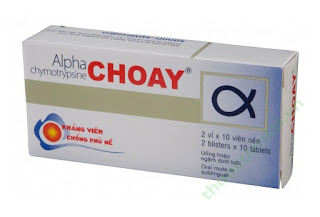Alpha chymotrypsine CHOAY
 |
FORM AND PRESENTATION:
Tablet (white).
Blister of 10 tablets. Box of 2 blisters or box of 1
blister. COMPOSITION:
Each tablet contains:
Chymotrypsine or alphachymotrypsine 21(jkatals (or 25 C.Hb unity tablet)
Excipients q.s.: Peppermint oil, magnesium stearate,
wheat starch, sugar.
INDICATION:
Enzymatic anti-oedema and anti-inflammatory:
Treatment of post - traumatic or postoperation
oedema (i.e., soft tissue injuries, acute traumatic injuries, sprains,
contusions, hematomas, ecchymoses, infections, edema of- the eyelids, muscle
cramps, and sports injuries).
DOSAGE AND ADMINISTRATION:
Oral route:
2 tablets, 3 to 4 times/ day. Tablets should also be
taken with at least 8 oz equivalent to 240 ml of water to help activate the
enzyme.
4 to 6 tablets/ day in divided doses. Tablet should
be slowly dissolved under the tongue.
CONTRA-INDICATION:
Allergic to any components of the product.
chymotrypsine is contraindicated in patients with
decreased alpha 1 antitrypsine. Generally, patients with COPD, especially
emphysema and patients presenting with nephrotic syndrome are also likely
candidates for decreased alpha 1 antitrypsine. UNDESIRABLE EFFECTS:
There do not appear to be any long-term side effects
from chymotrypsin therapy if precautions for its use are followed in precaution
in use.
Studies have shown that at recommended doses,
enzymes cannot be detected in blood analysis after 24-48 hours. Temporary side
effects that may occur (but that should disappear when therapy is discontinued
or dosage is reduced) include changes in the color, consistency, and odor of
the stool. Some individuals may experience gastrointestinal disturbances, such
as flatulence, a feeling of fullness, diarrhea, constipation, or nausea.
With high doses, minor allergic reactions such as
reddening of the skin may occur.
package insert, please inform your doctor.
PRECAUTION IN USE:
chymotrypsine is generally well tolerated and not
associated with any significant side effects.
People who should not
use enzyme therapy include those with hereditary clotting disorders such as
hemophilia, those suffering from coagulation disturbances, those who are just
about to or have undergone surgery, those on anticoagulant therapy, anyone
suffering from protein allergies, and pregnant women or those breast-feeding,
palient has stomach ulcers.
INTERACTIONS:
Chymotrypsine is most often used in combination with
other enzymes to enhance its treatment potential. In addition,
a well-balanced diet or the 'OĨĨOÍ vitamin and
mineral supplements are recommended to stimulate chymotrypsine activity.
Some types of seeds, including jojoba and wild soja
seeds, have been found to contain proteins that inhibit the activity of
chymotrypsine. These proteins can be inactivated by boiling the seeds.
Chymotrypsine should not be used together with
acetylcysteine, a drug used to thin mucus in the lungs. It should also not be
used together with anticoagulant (blood Jthinning) drugs, as it increases their
effects.
PREGNANCY AND BREAST-FEEDING: chymotrypsine should
not be used for pregnant and breastfeeding women.
PHARMACOKINETICS:
Chymotrypsine is a digestive enzyme that breaks down
proteins (i.e., it is a proteolytic enzyme; it can also be referred to as a
protease). It is naturally produced by the pancreas in the human body. However,
it can also be taken as an enzyme supplement to improve health and digestion
and aid in the treatment of various diseases.
Protease, which breaks protein molecules into
dipeptides and some single amino acids. In addition to chymotrypsine, other
protease enzymes secreted by the pancreas include trypsine and
carboxypeptidase.
PHARMACODYNAMICS:
Enzymatic anti-oedema and anti-inflammatory.
As an anti-inflammatory agent, the chymotrypsine and
the other protease enzymes prevent tissue damage during inflammation and the
formation of fibrin clots. Protease enzymes participate in the breakdown of
fibrin in a process called fibrinolysis. Fibrin causes a wall to form around an
area of inflammation, resulting in the blockage of blood and lymph vessels,
which leads to swelling. Fibrin can also cause the development of blood clots.
STORAGE:
Store in dry place, at temperature below 25°c.
SHELF LIFE: 18 months from the manufacturing date.
Prescription only medicine
Keep out of the reach of children
Read carefully the leaflet before use
If you have any questions, ask your doctor
PHARMACEUTICAL SHAREHOLDING COMPANY SANOFI-SYNTHELABO VIETNAM
(GMP-WHO certified)









Chymotrypsin is a digestive enzyme component of pancreatic juice acting in the duodenum where it performs proteolysis, the breakdown of proteins and polypeptides. Chymotrypsin preferentially cleaves peptide amide bonds where the carboxyl side of the amide bond (the P1 position) is a large hydrophobic amino acid (tyrosine, tryptophan, and phenylalanine). chymotrypsin
ReplyDelete